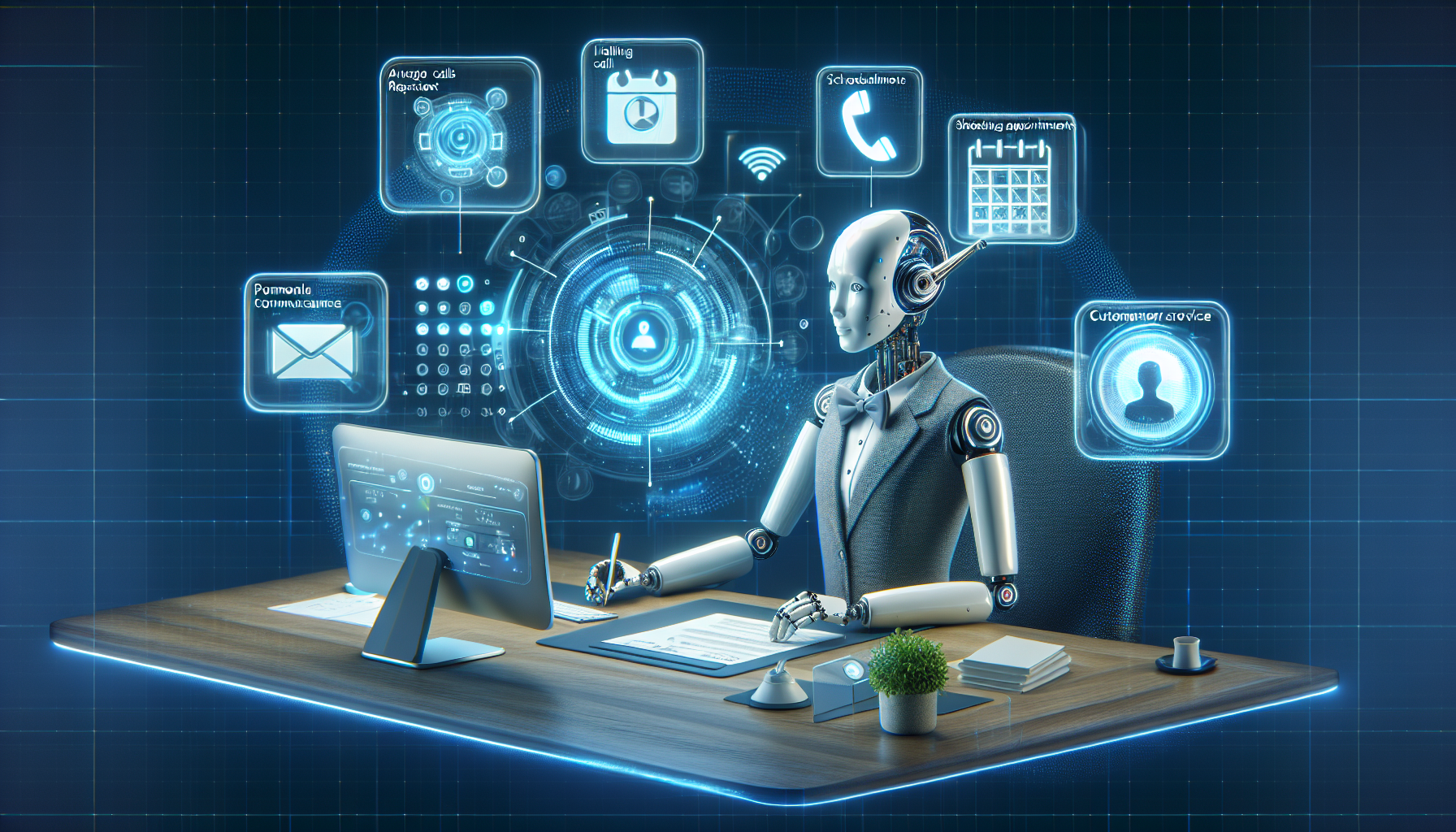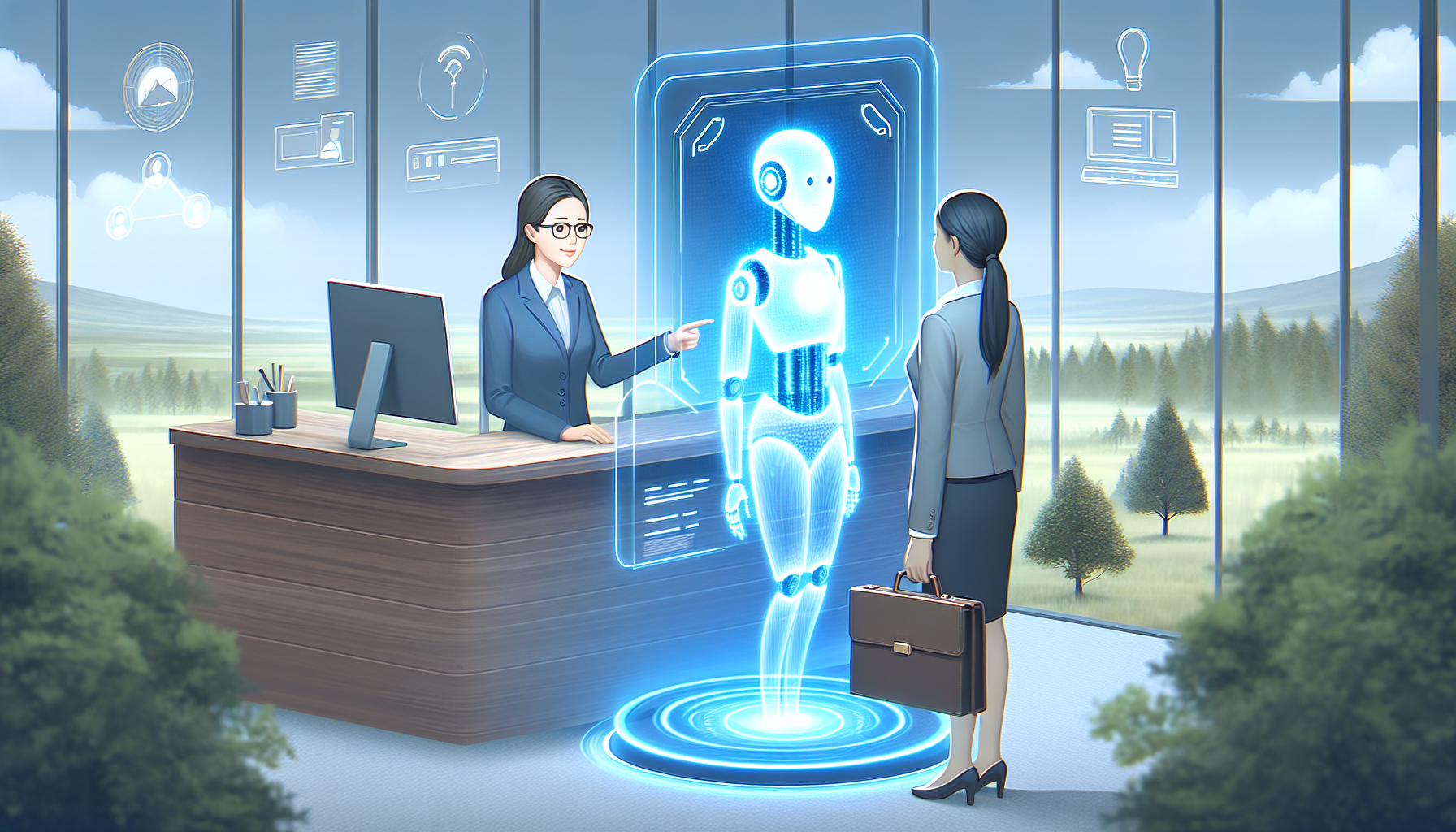
In an increasingly digital world, businesses are leveraging artificial intelligence (AI) to bolster their operations and enhance customer experience. One such innovation is the use of AI Receptionists, a technology rapidly transforming the business environment. An AI receptionist, essentially functioning as a virtual assistant, helps organizations streamline their customer service and administrative tasks.

At its core, an AI receptionist excels in automated call handling, reducing the need for manual labor and ensuring that no customer call goes unanswered. This functionality not only boosts customer service efficiency, but also facilitates 24/7 availability, catering to clients across different time zones.
In adjunct to managing calls, AI receptionists are proficient in appointment scheduling. Symbiotic integration with calendar applications negates the risk of double-booking and appointment overlaps. This seamless automation gives businesses the room to channel their human resources towards more critical tasks.
The trait distinguishing AI receptionists from traditional systems is its capability for real-time customer service. Thanks to machine learning and natural language processing, these AI systems can understand customer queries, respond proactively, and even generate personalized recommendations. This real-time, personalized approach can greatly enhance the customer service experience and drive customer loyalty.
In summary, AI receptionists are not just another tech novelty. They are fundamentally changing the way businesses operate and communicate with their customers. By automating routine tasks, they help businesses operate more efficiently and ensure a consistent user experience—a crucial facet in today's competitive business landscape.
```In the complex web of modern business, efficient management during periods of disruption is paramount. This management process is often referred to as Business Continuity Planning (BCP). A crucial strategy held in high regards across industry practices, BCP assists enterprises in preempting unknown risks, minimizing potential damages, and assuring the least possible disruption to operations.
BCP primarily involves the identification of potential risks and threats an organization may face and the formulation of viable strategies to ensure operations continue unaffected. This is achieved through a meticulous four-step process involving: risk identification, risk management, contingency strategizing, and contingency plan execution.
At the inception of BCP is risk identification. This step implies understanding what threats exist or could exist in the foreseeable future. This encompasses anything from natural disasters to technology failures or even political upheavals. The next step, risk management, is concerned with analyzing these threats and foreseeing their effect on operations. The organization then considers preventive measures and mitigation strategies.
With a comprehensive understanding of the potential risks, an enterprise then formulates their contingency strategies. These strategies are essentially backup plans to maintain operations during a crisis. The final stage, contingency plan execution, consists of implementing these strategies while assessing and refining them through testing and reviews.
Effective BCP is non-negotiable in the successful, long-term operation of any business. It supports an organization’s ability to promptly recover from a crisis, ensures legal and regulatory compliance, safeguards the company’s reputation and customer loyalty, and contributes significantly to overall organizational resilience.
In recent years, innovative technology trends have been transforming the traditional approach to BCP. More specifically, the increasing adoption of Artificial Intelligence (AI) has especially made its mark. AI receptionists, in particular, are playing a significant role in the new-age BCP dynamics.
The advent of AI receptionists is a game-changer in crisis management and overall business continuity planning. With their potential to handle multiple tasks simultaneously and work around the clock, AI receptionists Artificial Intelligence) aids businesses in maintaining seamless operations, especially during times of crisis.
In the face of unexpected events – like a natural disaster or a global pandemic – that could potentially stall business operations, AI receptionists can step up to the plate. They can accommodate increased call volumes that human receptionists might be overwhelmed with.

AI receptionists aren't just about dealing with number surges; they also ensure customer service quality never wavers. Equipped with natural language processing capabilities, these receptionists understand customer inquiries and provide timely and appropriate responses. No more delayed replies or exhausted receptionists- AI offers a hassle-free service to your customers, thus enhancing customer satisfaction and your brand's reputation even amid a crisis.
By assuming functions typically performed by human receptionists, AI-powered counterparts not only contribute to business continuity but they also allow human staff to focus on more critical tasks during a crisis. Businesses get to maintain productivity levels and function stably regardless of peak periods or unexpected events.
Crises are inevitable in the business world. Having a plan that copes with these uncertain times is critical. Fortunately, technology provides a suitable answer with AI receptionists. They not only maintain customer service quality but also handle peak periods or unexpected events with efficiency and effectiveness. Including AI technologies in your business continuity plan positions you well to deal with potential crises.
The evolution of technology has brought us to a juncture where AI receptionists are increasingly playing a pivotal role in maintaining, and even improving, business operations. Key to their effective performance is their seamless integration with pre-existing business technologies, notably Customer Relationship Management (CRM) systems and various other communication platforms. Not only does this integration bring about an elevated level of efficiency, it also inherently enhances overall system resilience.
Foremost, let's consider why this integration is paramount. AI receptionists, such as Zendesk's Answer Bot or Clarabridge's Engagement Chat, fill in the gap in customer interactions, offering immediate responses and support. However, to be most effective, they need to access and utilize consumer data securely stored within the CRM system. This coupling enables the AI receptionist to deliver personalized responses while updating customer profiles with the latest interaction data. The integration failing can significantly disrupt business continuity and customer engagement - thus the resilience of the system becomes of utmost importance.
Secondly, the resilience of these systems, bolstered by the implementation of AI receptionists, impacts business continuity planning. They offer a redundancy in the face of human limitations or unpredictable events. For instance, suppose a natural disaster or a local health crisis results in staff scarcity. In that case, the AI receptionist continues to provide uninterrupted support, ensuring business continuity.
Beyond mere backup, AI receptionists can also distribute workload during peak hours, managing surges in customer inquiries that might otherwise bottleneck the human support team. This additional layer of resilience, enabled by technological integration, is undeniably an invaluable asset to any organization's business continuity planning.
Therefore, the continued evolution and improved integration of AI receptionists with business technologies underscore the critical need for system resilience. Through automation, we can not only maintain but potentially enhance the continuity of our business operations. From serving as a safety net in challenging times to aiding in workload distribution, the role of AI receptionists in maintaining system resilience cannot be underestimated.
In recent years, businesses worldwide have effectively used AI receptionists to enhance their business continuity planning. The artificial intelligence capabilities these virtual receptionists provide ensure smooth operations during unforeseen circumstances that often interrupt regular business activities.

One impressive example is the global consultancy firm, Martec Group. Their utilization of an AI receptionist during the COVID-19 pandemic proved invaluable in maintaining unhindered customer contact and minimizing disruption of services. More about their experience can be read here.
Another case study is that of Spring Health, a mental health tech company. By leveraging AI receptionist technology, they experienced increased efficiency in patient interactions, even amidst the pressure of unexpectedly high patient influx due to the pandemic. This use case demonstrates not only business continuity, but an improvement in customer satisfaction and engagement. Detailed insights into their experience can be found on their official website.
In both instances, the AI receptionists were instrumental in managing business communications and helped maintain smooth operations. These examples underline the potential of AI receptionists in strengthening business continuity plans, a crucial consideration for any business looking to bolster its resilience against uncertainties.
In conclusion, the advent of AI technology has opened the doors for modern businesses to add another reliable layer to their continuity plans. And the real-world examples of Martec Group and Spring Health are testament to the difference AI receptionists can make in upkeeping and even enhancing operations during disrupted times.
As we stand on the brink of a new era where digital transformation is the norm, AI receptionists are emerging as a transformative force that is reshaping the future of the business world. Through sophisticated combinations of machine learning algorithms and natural language processing, these technologies are revolutionising the way businesses operate by guaranteeing seamless engagement with customers round the clock, supporting business continuity planning.
AI receptionists are anticipated to become more intelligent and intuitive. They are expected to handle complex tasks beyond answering FAQs, such as resolving difficult customer queries, setting up meetings, and even making proactive suggestions based on customer behaviours, trends, or preferences. Tech experts predict that as these systems grow more sophisticated, their capacity to ensure business continuity during crises will increase significantly.
One of the most intriguing trends in the AI receptionist realm is the development of emotional intelligence in AI systems. Businesses are looking to humanize AI interfaces to build stronger customer relationships. AI programs are being developed to detect and respond to user's emotional state, based on their tone, language use, and other cues, ushering an advanced level of customer service. Emotion Recognition Technology is expected to be a game-changer in this context, helping businesses maintain their rapport with customers, thus contributing to business continuity.
Furthermore, greater integration of AI receptionists with other business systems is on the horizon. The confluence of AI receptionists and CRM (Customer Relationship Management) platforms, for instance, could create a comprehensive, automated solution to manage customer interactions effectively. It's this level of technological integration that could act as a significant factor in business continuity planning.
AI receptionists are set to play a crucial role in future-proofing businesses against potential disruptions, thereby becoming an integral part of business continuity planning. As automation and AI technology continue to advance, so will the capacity for businesses to maintain their operations in times of crisis.
Start your free trial for My AI Front Desk today, it takes minutes to setup!








